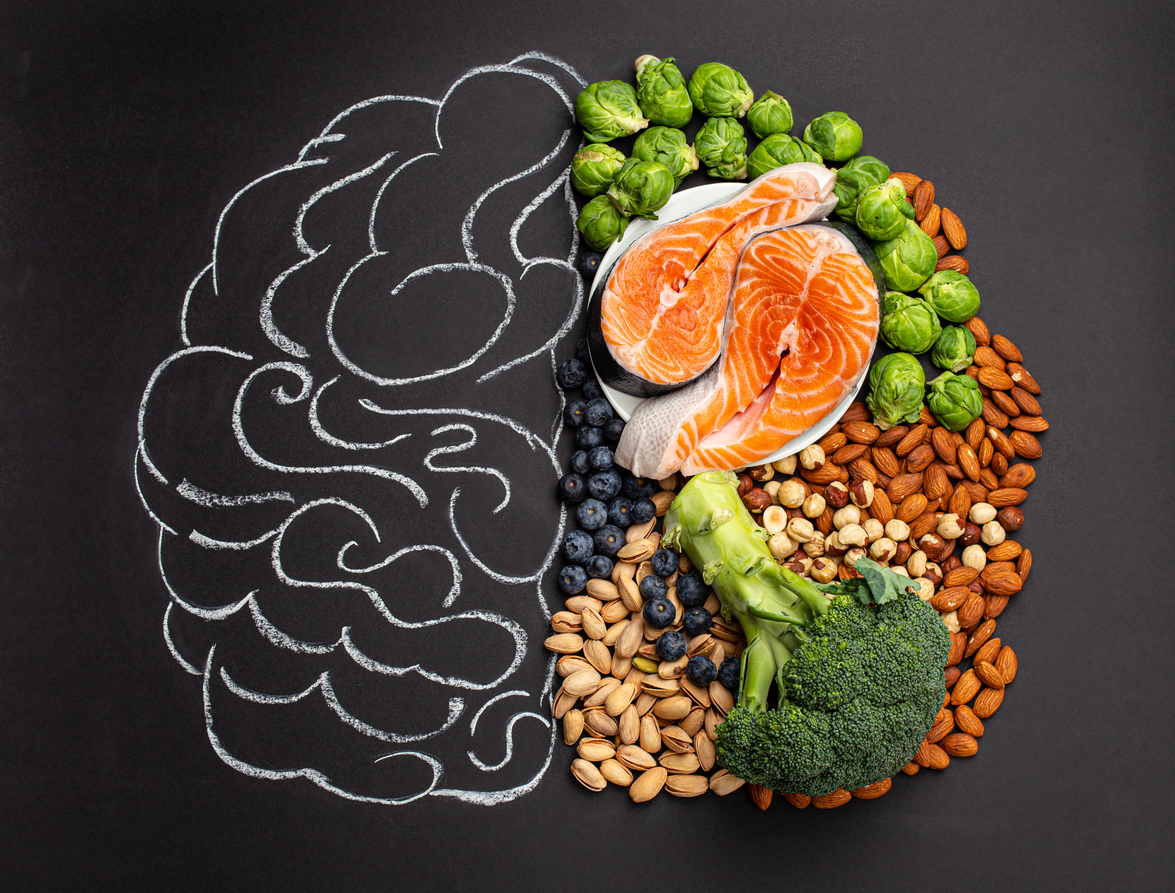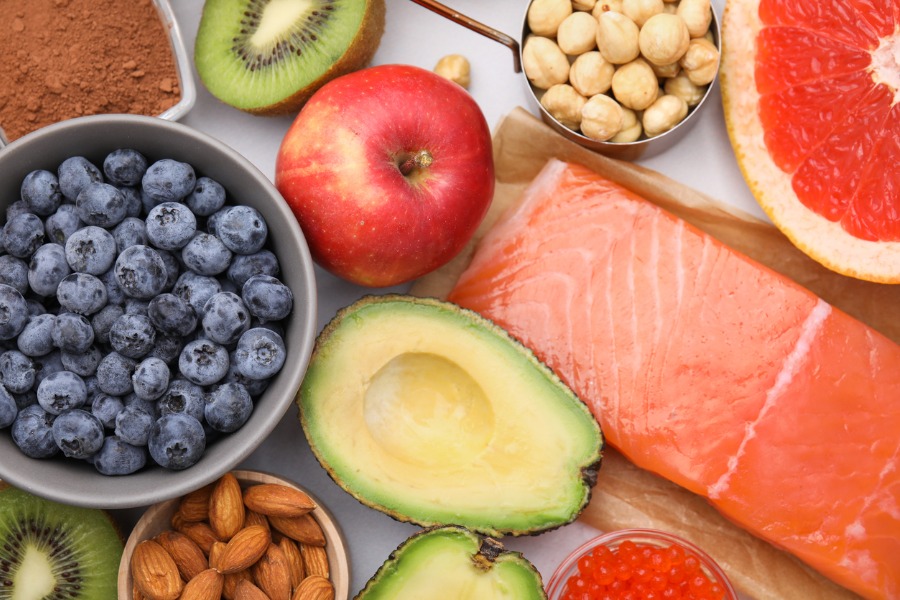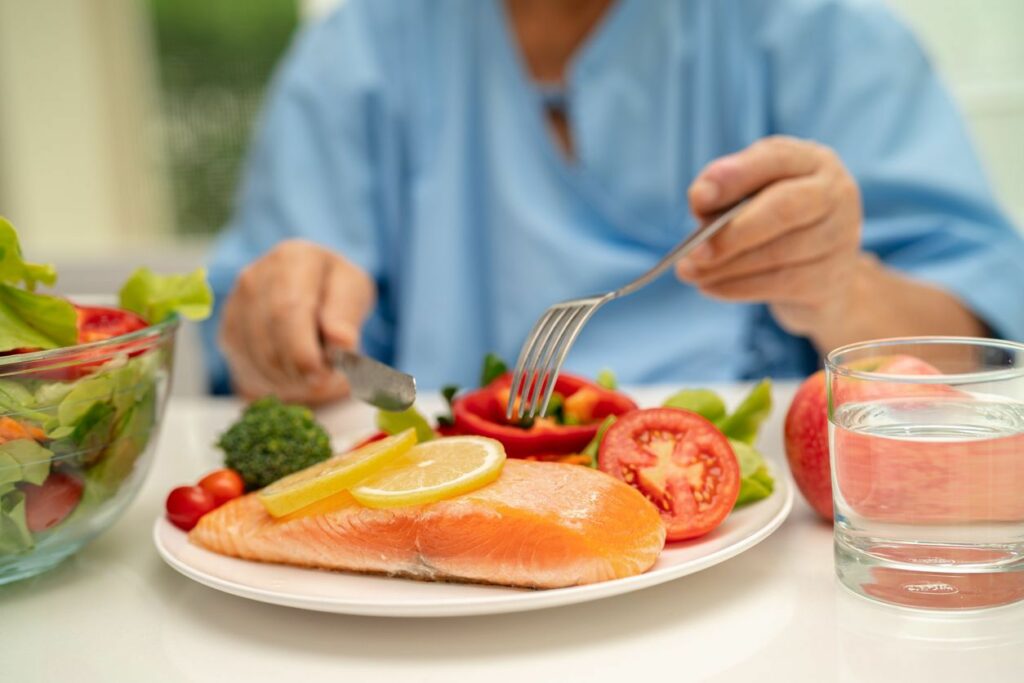
Enhancing Cognitive and Mental Health Through Diet
As we age, maintaining cognitive and mental health becomes increasingly important. A balanced diet rich in brain-boosting foods can play a crucial role in enhancing mental sharpness, overall brain function, and mental health. For seniors, focusing on nutrition is a proactive way to delay the progression of age-related cognitive decline. Let’s take a look at how brain-boosting foods for seniors can help boost mental health and the dietary steps that seniors can take to reduce their risks for cognitive decline.
What is Cognitive Health?
Cognitive health refers to the ability to think clearly, learn, and remember. It encompasses various mental abilities, such as memory, decision-making, and attention. As we age, our cognitive functions can decline, leading to conditions like dementia and Alzheimer’s disease.
In addition to cognitive decline with age, mental health can become an issue. As many as 25% of seniors 65 and older experience some sort of mental health issue. Incorporating certain brain-boosting foods and supplements into your diet can help maintain and improve cognitive and mental health.
What Are The Top Brain-Boosting Foods for Seniors?

Below are examples of brain-boosting foods for seniors that may help boost their long-term cognitive and mental health.
1. Fatty Fish
Fish such as salmon, trout, and sardines are excellent sources of omega-3 fatty acids. Omega-3s are essential fats linked to lower levels of beta-amyloid, a protein that forms destructive clumps in the brains of people with Alzheimer’s disease. Consuming fatty fish regularly is believed to enhance memory and improve overall brain function.
2. Berries
Berries, especially blueberries, strawberries, and blackberries, are packed with antioxidants and flavonoids. These compounds have anti-inflammatory and antioxidant effects, which are believed to reduce brain aging and improve communication between brain cells. Including various berries in your diet may boost cognitive health and protect against age-related memory loss.
3. Nuts and Seeds
Nuts and seeds, particularly walnuts, almonds, flaxseeds, and chia seeds, are rich in antioxidants, healthy fats, and vitamin E. Vitamin E has been shown to help reduce cognitive decline, especially in older adults.
These nutritious snacks can support brain health by protecting cells from oxidative stress and inflammation. Nuts are also high in lithium, which may help with psychiatric disorders such as bipolar disorder.
4. Leafy Green Vegetables
Leafy greens like spinach, kale, and broccoli contain vitamins, minerals, and antioxidants that promote brain health. They contain high levels of vitamin K, folate, beta-carotene, and lutein. Research has shown that these foods may help slow cognitive decline and improve brain function.
5. Whole Grains
Oats, barley, brown rice, and quinoa are examples of whole grains that are excellent sources of dietary fiber and essential nutrients. They provide a steady energy supply to the brain and help maintain stable blood sugar levels. Whole grains also contain B vitamins, which are important for brain health and can improve cognitive function.
6. Dark Chocolate
Dark chocolate is rich in flavonoids, caffeine, and antioxidants. Flavonoids in dark chocolate can enhance memory, attention, and problem-solving skills by increasing blood flow to the brain. Enjoying a small amount of dark chocolate daily can be a delightful way to boost brain health.
7. Avocados
Avocados are packed with monounsaturated fats, which promote healthy blood flow and support brain function. They also contain vitamin K and folate, which can help protect against stroke and cognitive decline. Adding avocados to your diet may help improve brain health and overall well-being.
8. Coffee and Tea
Both coffee and tea contain caffeine, which can boost brain function, improve mood, and enhance alertness. Additionally, green tea is rich in L-theanine, an amino acid that can increase dopamine and alpha wave production in the brain. These effects may improve brain function and protect against cognitive decline. Some seniors are sensitive to the effects of caffeine, so if you are adding it to your diet, check with your doctor first.
9. Turmeric
Turmeric is a spice that contains curcumin, a powerful antioxidant and anti-inflammatory compound. Curcumin has been shown to cross the blood-brain barrier and help improve memory, reduce depression, and potentially even grow new brain cells. Incorporating turmeric into your diet can provide significant benefits for brain health.
10. Eggs
Eggs are an excellent source of several nutrients tied to brain health, including vitamins B6 and B12, folate, and choline. Choline is essential for producing acetylcholine, a neurotransmitter that regulates mood and memory. Including eggs in your diet can support cognitive function and mental clarity.
How Can I Create a Brain-Healthy Meal Plan?

Change can be tough. Adding or removing foods from a diet they have become accustomed to is something many people struggle with.
To help you incorporate these brain-boosting foods into your daily diet, here are some examples of simple meals and small changes you can make:
- Breakfast: Start your day with a bowl of oatmeal topped with fresh berries and a sprinkle of flaxseed.
- Lunch: Enjoy a salad with leafy greens, avocado, and various colorful vegetables. Add a serving of fatty fish like salmon.
- Snack: Munch on a handful of nuts and seeds or a piece of dark chocolate.
- Dinner: Include a lean protein like a skinless chicken breast, whole grains like quinoa or brown rice, and a side of steamed broccoli or kale.
- Beverages: Drink plenty of water. Sip on green tea or coffee throughout the day for a brain boost.
If preparing meals or remembering to eat is challenging for a senior loved one, consider planning meals in advance. Look for healthy brain-boosting recipes that are easy to prepare in advance and freeze for microwaving later. Professional caregivers can assist with this task, remind seniors to eat regularly and provide companionship during mealtimes, making dining a more enjoyable experience.
The Role of Supplements in a Brain-Boosting Diet

If meeting the daily requirements for certain vitamins and minerals is challenging, consider adding supplements to your diet. Some bodies need more of certain vitamins than others, but decisions about which supplements to add should be made in consultation with your physician.
Calcium, magnesium, folate, potassium, fiber, omega 3, and vitamins D, C, B6, E, and B12 are common nutrition deficiencies among seniors.
In addition to nutritional supplements, some people find that taking supplements for mental health is helpful. Some research indicates supplements like lithium orotate can help with age-related disorders, such as cardiovascular disease, sarcopenia, osteoporosis, Alzheimer’s disease, obesity, and type 2 diabetes mellitus.
The U.S. government has some guidelines for seniors when considering dietary supplements. Look through this and talk to your doctor about supplements you’re considering to avoid unwanted side effects or contradictions related to medications you may be taking.
Conclusion
Maintaining cognitive and mental health is essential for seniors to enjoy a high quality of life. By incorporating brain-boosting foods for seniors, you can support mental sharpness, enhance memory, protect against cognitive decline, and have a mentally healthier life.
Also, consider supplements, which may provide additional benefits for dietary and mental health. Always consult with a healthcare professional before starting any new supplement regimen.Salus Homecare of Orange County wishes you and yours a healthy and vibrant life. If your loved one needs support or guidance on improving their diet for better cognitive health, we’re here to help. Contact us anytime to learn more about our comprehensive care programs and services.
